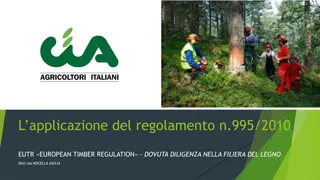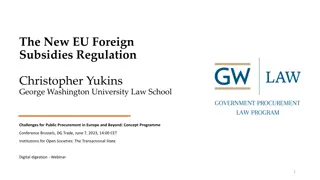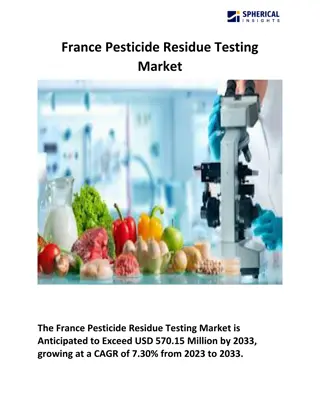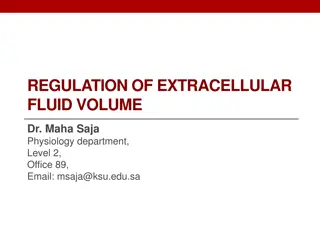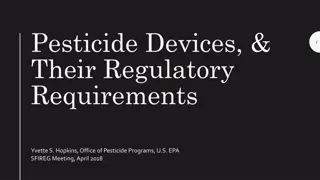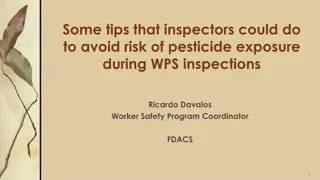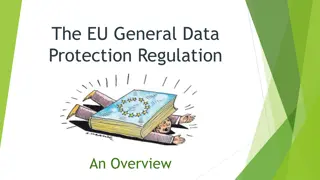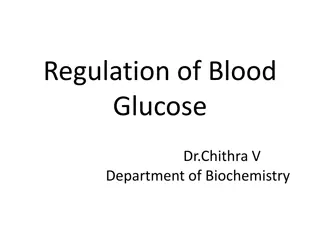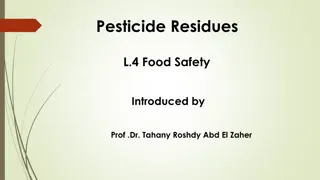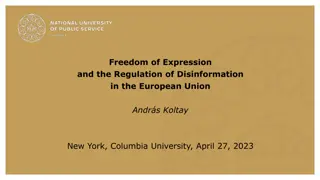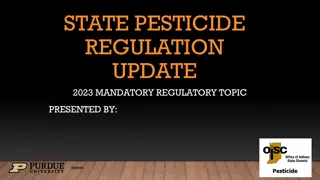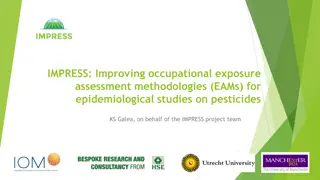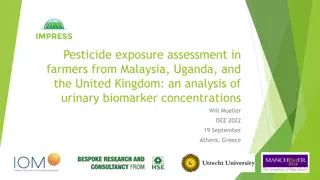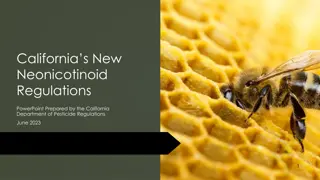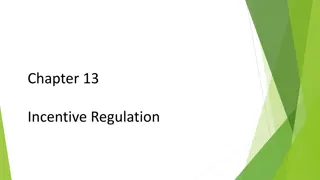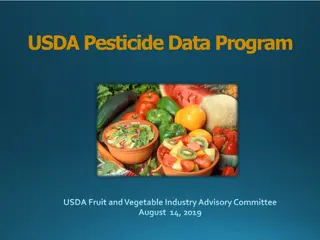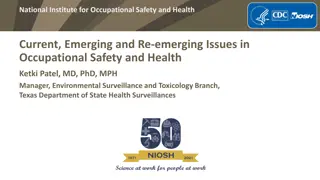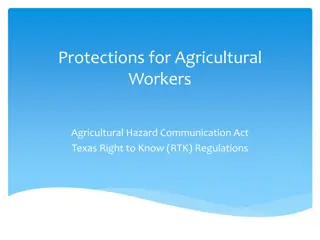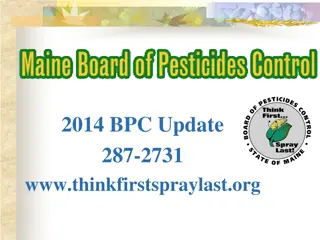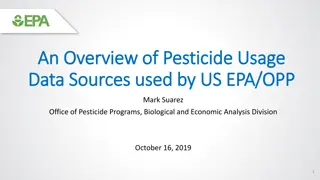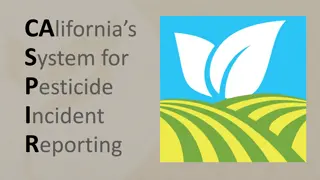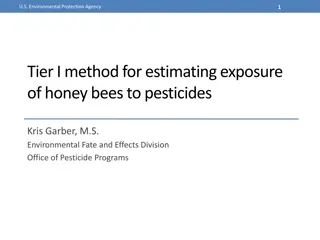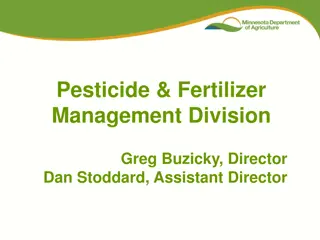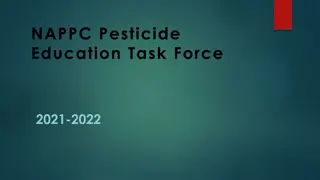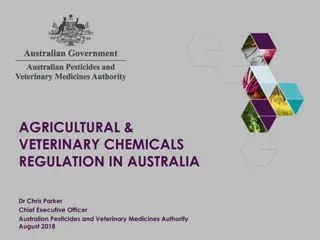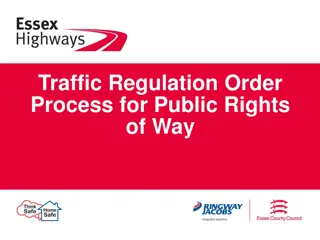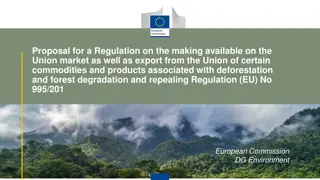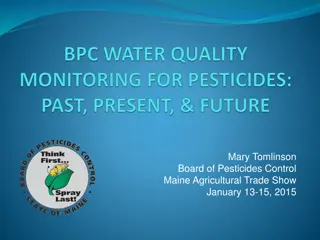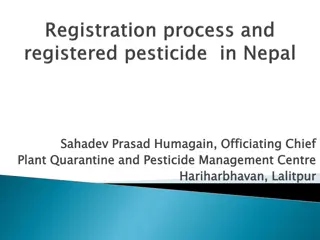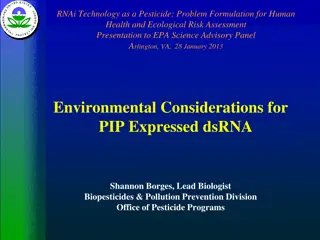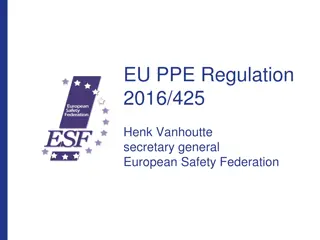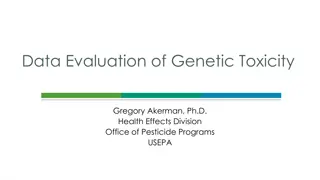Sustainable Rice Production in Pakistan: Challenges and Strategies
Pakistan's economy heavily relies on rice exports, with the country being a significant producer and exporter. However, challenges such as pesticide residues, major insect pests, and diseases threaten rice production. Key parameters for production include cultivation of improved varieties, pest mana
2 views • 42 slides
Overview of EU Timber Regulation (EUTR) 995/2010 and its Application in Italy
The EU Timber Regulation (EUTR) 995/2010 aims to combat illegal timber trade by ensuring that timber placed on the European market is from legal sources. Applicable to most wood materials regardless of origin, the regulation requires due diligence in the timber supply chain. Italy implemented the re
2 views • 44 slides
Challenges of EU Foreign Subsidies Regulation in Public Procurement
The EU Foreign Subsidies Regulation (FSR) imposes EU State aid rules on foreign vendors in EU Member States, creating disclosure requirements and review processes. This regulation poses administrative burdens and strategic challenges for vendors, particularly impacting EU-based vendors purchasing fr
2 views • 7 slides
Alternatives to Regulation in the Market: Public Enterprise and Franchise Bidding
Understanding the concept of natural monopoly problem and exploring the alternatives to market regulation such as public enterprise and franchise bidding, with a focus on cable television. Delve into the challenges and benefits of each approach, including the potential of franchise bidding to achiev
6 views • 22 slides
Scale Based Regulation 2023 - Non-Banking Financial Company (NBFCs)
On October 19, 2023, the Reserve Bank of India (\u201cRBI\u201d) has issued \u2018Master Direction \u2013 Reserve Bank of India (Non-Banking Financial Company \u2013 Scale Based Regulation) Directions 2023\u2019 (\u2018SBR Master Direction\u2019). The SBR Master Direction aims to harmonize the Previ
0 views • 9 slides
France Pesticide Residue Testing Market
The France Pesticide Residue Testing Market is Anticipated to Exceed USD 570.15 Million by 2033, growing at a CAGR of 7.30% from 2023 to 2033.\u00a0\n
0 views • 4 slides
Regulation of Extracellular Fluid Volume: A Comprehensive Overview
Understanding the intricate mechanisms involved in the regulation of extracellular fluid volume is essential for maintaining normal body function. This includes sensor and effector roles in renal regulation, the influence of aldosterone on Na+ reabsorption, the significance of Na+ balance, and the i
1 views • 22 slides
Understanding Regulatory Requirements for Pesticide Devices
Pesticide devices, as defined by FIFRA, play a crucial role in trapping, destroying, repelling, or mitigating pests or plant and animal life. While not required to be registered with the EPA, these devices are regulated under FIFRA sections 2(q)(1), 7, and 8, with specific labeling and packaging req
0 views • 10 slides
Tips to Prevent Pesticide Exposure During WPS Inspections
Inspectors should be familiar with establishment operations, inquire about pesticide use, avoid entering treated areas without assurance, wear proper PPE, identify decontamination supplies, and practice good hygiene to minimize the risk of pesticide exposure during inspections. These precautions hel
5 views • 10 slides
Understanding the EU General Data Protection Regulation (EU GDPR)
The EU General Data Protection Regulation (EU GDPR) is a comprehensive regulation that governs the processing of personal data of individuals in the EU. It came into effect on May 25, 2018, and applies to all organizations handling personal data of EU residents. The regulation includes key definitio
4 views • 21 slides
Emerging Trends in Regulation and Credentialing for Advanced Practice Nursing
Explore the evolving landscape of regulation and credentialing in advanced practice nursing, including inconsistencies in titles, the debate between regulation and credentialing, and the challenges and purposes of regulation. Discover the impact on roles, education, and patient safety in this rapidl
0 views • 22 slides
Regulation of Blood Glucose and Its Importance in Maintaining Health
Blood glucose regulation is crucial for energy supply in the body, particularly for brain function. Understanding the balance of glucose entering and leaving the blood through processes like absorption, glycogenolysis, and gluconeogenesis is vital. Hormones like insulin and glucagon play key roles i
0 views • 10 slides
Extraction Methods in Pesticide Residue Analysis for Food Safety
Extraction methods play a crucial role in separating pesticide residues from food matrices for analysis. Techniques involve using solvents to efficiently remove pesticides without causing chemical changes. The choice of extraction method depends on the substrate type, with liquid and solid substrate
6 views • 25 slides
Regulation of Disinformation in the European Union: A Comprehensive Overview
The discussion covers the regulation of disinformation in the European Union, focusing on freedom of expression, legitimate restrictions on untruthful speech, media regulation provisions, and the code of practice on disinformation. It delves into key aspects such as hate speech, right of reply, regu
10 views • 15 slides
State Pesticide Regulation Update 2023: Mandatory Changes and Stakeholder Involvement
The State Pesticide Regulation Update for 2023 brings significant changes including Restricted Use Pesticide applications, record-keeping requirements, and supervision of applicators. The revisions were prompted by applicator certification and training rules set by the EPA, along with public awarene
0 views • 25 slides
Enhancing Self-Regulation for Formative Assessment through Social and Emotional Learning
Explore the significance of self-regulation in formative assessment, understand key concepts like self-control, emotional competence, and perseverance. Discover actionable strategies to implement self-regulation interventions with students and train other adults effectively. Future orientation and s
0 views • 25 slides
Enhancing Pesticide Exposure Assessment for Epidemiological Studies
Focuses on IMPRESS project aiming to improve methodologies for assessing occupational pesticide exposure in epidemiological studies. Reviews challenges in retrospective exposure assessment, proposes methodologies, and presents key project results to date, emphasizing the use of various exposure asse
1 views • 15 slides
Pesticide Exposure Assessment in Farmers from Malaysia, Uganda, and the United Kingdom
This study evaluates the impact of pesticide exposure on farmers' health in Malaysia, Uganda, and the UK using urinary biomarker concentrations. Multiple cohorts are analyzed to assess associations between exposure-modifying factors and urine metabolite measurements. The IMPRESS project focuses on i
0 views • 12 slides
New Regulations on Neonicotinoids in California: An Overview
The presentation by the California Department of Pesticide Regulations highlights the new regulations on neonicotinoids, systemic pesticides affecting insects' central nervous systems. It provides insights into the history of neonicotinoid use in California, the development of alternative pesticides
0 views • 19 slides
Enhancing Pesticide Spray Effectiveness with Adjuvants for Rosarians
Adjuvants play a crucial role in improving the efficacy of pesticide applications for rosarians. They aid in maximizing the impact of pesticides by enhancing their application process. Various types of adjuvants, such as surfactants, extenders, and penetrants, serve different purposes like adjusting
0 views • 11 slides
Understanding Incentive Regulation in Utility Management
Incentive regulation in utility management involves various approaches such as Rate of Return Regulation (RORR), Price Cap Regulation, and Performance-based Regulation. Each method has its pros and cons, requiring careful consideration based on the specific setting. Rate hearings are essential quasi
0 views • 18 slides
USDA Pesticide Data Program Overview
The USDA Pesticide Data Program (PDP) provides high-quality pesticide residue data for US foods to support regulatory decision-making and ensure food safety. Through cooperative agreements with participating states, the program conducts sampling of various commodities, including fresh fruits and veg
0 views • 17 slides
Occupational Pesticide Safety and Health Concerns
Occupational safety and health issues related to pesticide exposure are a significant concern globally. Limited surveillance data on pesticide exposure and related illnesses are available, with a high percentage of farmers being affected annually. Various occupations beyond farming also face potenti
1 views • 25 slides
Enhancing Self-Regulation Skills in Children: Strategies and Tips
Understanding and fostering self-regulation in children is crucial for their development. Self-regulation involves controlling impulses, focusing, and shifting between tasks. This article delves into the internal mechanisms of self-regulation, such as executive function, and provides practical tips
1 views • 22 slides
Agricultural Workers' Protections under Right-to-Know Regulations
Agricultural workers in Texas have rights under the Agricultural Hazard Communication Act, also known as Right-to-Know (RTK) Law. This Act ensures that agricultural workers receive essential information regarding pesticide exposure, workplace chemicals, and their entitlement to health and safety det
0 views • 15 slides
Important Updates in Pesticide Regulations and Program Changes
New pesticide regulations and program changes are introduced, including requirements for obtaining a pesticide applicator license, major proposed changes to the Worker Protection Standard (WPS) by the EPA, introduction of new inspectors, and the phaseout of Endosulfan. Special Maine registrations fo
0 views • 66 slides
Understanding Pesticide Data Collection and Analysis
Pesticide data usage is crucial for accurate assessments and prioritization of areas with high likelihood of usage. Various sources, quality requirements, and data considerations are highlighted, emphasizing the importance of incorporating usage data for informed decision-making.
0 views • 12 slides
Essential Facilities in a Bio-Pesticide Laboratory for Smart Agriculture
Establishing a bio-pesticide laboratory is vital for research, development, and mass production of bio-pesticides. Key rooms include sterilization, media preparation, inoculation, growth chamber, mixing, insect rearing, and washing rooms. The sterilization room houses equipment like autoclave and ho
0 views • 10 slides
California's System for Pesticide Incident Reporting Overview
Explore California's CASPIR system for reporting pesticide incidents, designed to enhance communication between counties, DPR, and fieldworker groups. The system's timeline, purpose, and key features, including incident report submission, intelligent case routing, mobile app functionality, and admin
0 views • 33 slides
U.S. EPA Tier I Method for Bee Pesticide Exposure Estimation
Tier I assessment by the U.S. Environmental Protection Agency focuses on generating conservative estimates of pesticide exposures to honey bees. The goal is to differentiate pesticides that pose risks to bees from those needing further evaluation. The process involves considering food consumption ra
0 views • 53 slides
Pesticide & Fertilizer Management Division Overview
The Pesticide & Fertilizer Management Division is a key state agency in Minnesota responsible for regulating pesticides and fertilizers, protecting groundwater, responding to emergencies, managing spills, and promoting agricultural water quality. The division works with farmers, industry stakeholder
0 views • 11 slides
NAPPC Pesticide Education Task Force 2021-2022 Summary
The NAPPC Pesticide Education Task Force for 2021-2022 aims to utilize pesticide registration and regulation as tools to safeguard and enhance pollinator health. The task force focuses on educating various audiences, including pesticide applicators, farmers, homeowners, educators, and state departme
1 views • 15 slides
Agricultural and Veterinary Chemicals Regulation in Australia - Overview
The regulation of agricultural and veterinary chemicals in Australia is overseen by the Australian Pesticides and Veterinary Medicines Authority (APVMA), established in 1993. The APVMA is responsible for assessing and registering pesticides and veterinary medicines to ensure their safety and effecti
0 views • 15 slides
Traffic Regulation Orders for Public Rights of Way in Essex
Traffic Regulation Orders (TROs) are essential for temporarily or permanently restricting public rights of way in Essex under the Road Traffic Regulation Act 1984. Temporary Traffic Regulation Orders (TTROs) are used for short-term restrictions due to works or safety reasons. The TTRO process involv
0 views • 15 slides
Regulation Proposal to Combat Deforestation and Forest Degradation in the European Union
The European Commission is proposing a regulation to prevent the entry and export of commodities linked to deforestation and forest degradation. This aligns with political commitments such as the European Green Deal and the Farm to Fork Strategy. Existing legislation like the FLEGT Regulation and th
0 views • 32 slides
Exploring Pesticide Monitoring and Contamination Studies in Maine
Mary Tomlinson's work with the Maine Board of Pesticides Control includes past studies on groundwater and surface water monitoring, ongoing monitoring initiatives, and future collaborative studies. The State Law mandates residue surveys to identify possible contamination sources and develop a pestic
1 views • 55 slides
Procedures and Management of Pesticide Registration in Nepal
This content provides detailed information on the registration procedures, management, and regulation of pesticides in Nepal. It covers the registration method, advantages of analogous registration, banned pesticides list, types of pesticides, and essential documentation requirements for pesticide r
0 views • 43 slides
Understanding Environmental Risks of RNAi Technology as a Pesticide
This presentation discusses the environmental considerations and risk assessments associated with RNAi technology as a pesticide, focusing on the unique challenges presented by dsRNA PIPs. Topics covered include ecological risk assessments, nontarget organism exposure, exposure assessments for PIP p
0 views • 13 slides
Overview of EU PPE Regulation 2016/425 Changes
The EU PPE Regulation 2016/425, effective from 21/4/2018, brings significant changes to Personal Protective Equipment (PPE) rules. It replaces Directive 89/686/EEC and introduces stricter guidelines for economic operators, Notified Bodies, and authorities. The regulation includes updated definitions
0 views • 22 slides
Evaluation of Genetic Toxicity in Pesticide Programs - Data Overview
The presentation by Dr. Gregory Akerman discusses the evaluation of genetic toxicity, focusing on genotoxicity data for glyphosate, including gene mutation, chromosomal abnormality, and primary DNA damage. It explores the consequences of genotoxicity, such as cancer risks and cell death, along with
0 views • 27 slides

